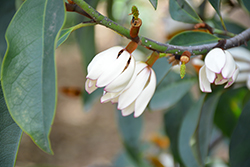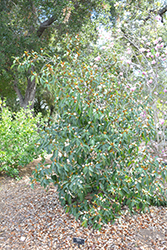It's all about ...
plants

Height: 15 feet
Spread: 15 feet
Sunlight:
![]()
![]()
Hardiness Zone: 9b
Other Names: Banana Shrub Hybrid
Description:
This impressive, large shrub has lustrous evergreen leaves and richly fragrant creamy white flowers with pink tips from early spring to summer; blooms at an early age
Ornamental Features
Fogg's #2 Magnolia features showy fragrant creamy white cup-shaped flowers with pink tips along the branches from early spring to early summer, which emerge from distinctive coppery-bronze flower buds. It has dark green evergreen foliage. The glossy pointy leaves remain dark green throughout the winter.
Landscape Attributes
Fogg's #2 Magnolia is a multi-stemmed evergreen shrub with a more or less rounded form. Its relatively coarse texture can be used to stand it apart from other landscape plants with finer foliage.
This is a relatively low maintenance shrub, and should only be pruned after flowering to avoid removing any of the current season's flowers. It has no significant negative characteristics.
Fogg's #2 Magnolia is recommended for the following landscape applications;
- Accent
- Mass Planting
- Hedges/Screening
- General Garden Use
- Container Planting
Planting & Growing
Fogg's #2 Magnolia will grow to be about 15 feet tall at maturity, with a spread of 15 feet. It has a low canopy, and is suitable for planting under power lines. It grows at a medium rate, and under ideal conditions can be expected to live for approximately 30 years.
This shrub does best in full sun to partial shade. It does best in average to evenly moist conditions, but will not tolerate standing water. It is not particular as to soil pH, but grows best in rich soils. It is somewhat tolerant of urban pollution. This particular variety is an interspecific hybrid.
Fogg's #2 Magnolia makes a fine choice for the outdoor landscape, but it is also well-suited for use in outdoor pots and containers. Because of its height, it is often used as a 'thriller' in the 'spiller-thriller-filler' container combination; plant it near the center of the pot, surrounded by smaller plants and those that spill over the edges. It is even sizeable enough that it can be grown alone in a suitable container. Note that when grown in a container, it may not perform exactly as indicated on the tag - this is to be expected. Also note that when growing plants in outdoor containers and baskets, they may require more frequent waterings than they would in the yard or garden. Be aware that in our climate, most plants cannot be expected to survive the winter if left in containers outdoors, and this plant is no exception. Contact our experts for more information on how to protect it over the winter months.
This plant is not reliably hardy in our region, and certain restrictions may apply; contact the store for more information.

